
University of Pittsburgh Press
The University of Pittsburgh Press is a publisher with distinguished lists in a wide range of scholarly and cultural fields. They publish books for general readers, scholars, and students. The Press focuses on selected academic areas: Latin American studies, Russian and East European studies, Central Asian studies, composition and literacy studies, environmental studies, urban studies, the history of architecture and the built environment, and the history and philosophy of science, technology, and medicine. Their books about Pittsburgh and Pennsylvania include history, art, architecture, photography, biography, fiction, and guidebooks.
Their renowned Pitt Poetry Series represents many of the finest poets active today, as reflected in the many prestigious awards their work has garnered over the past four decades. In addition, the Press is home to the Agnes Lynch Starrett Poetry Prize, the Donald Hall Prize for Poetry, and, in rotation with other university presses, the Cave Canem Poetry Prize. They sponsor the prestigious Drue Heinz Literature Prize, which recognises the finest collective works of short fiction available in an international competition.

Format: Paperback
Pages: 80
ISBN: 9780822961352
Pub Date: 23 Jan 2011
Description:
Bringing the Shovel Down maps the long and arduous process of being inculcated with the mythologies of state and power, the ramifications of that inculcation (largely, the loss of our humanity in the service of maintaining those mythologies), and finally, what it might mean, what it might provide us, if we were to transform those myths. The book, finally, has one underlying question: How might we better love one another?

Format: Paperback
Pages: 96
ISBN: 9780822961345
Pub Date: 18 Jan 2011
Description:
The Double Truth is a collection of poems that arc from myth to history, knowledge to mystery, Eros to natural love, animals to human beings, then back in an alternating poetic current that betrays a speaker who is at once a privileged witness of her time and a diachronic amalgam of voices that are as imagined as they are real in their anonymous legacy.
The Physics of Imaginary Objects
Format: Paperback
Pages: 160
ISBN: 9780822961550
Pub Date: 15 Jan 2011
Series: Drue Heinz Literature Prize
Description:
Winner of the 2010 Drue Heinz Literature PrizeThe Physics of Imaginary Objects, in fifteen stories and a novella, offers a very different kind of short fiction, blending story with verse to evoke fantasy, allegory, metaphor, love, body, mind, and nearly every sensory perception. Weaving in and out of the space that connects life and death in mysterious ways, these texts use carefully honed language that suggests a newfound spirituality.

Format: Paperback
Pages: 368
ISBN: 9780822961161
Pub Date: 09 Jan 2011
Description:
Thomas P. Miller defines college English studies as literacy studies and examines how it has evolved in tandem with broader developments in literacy and the literate. He maps out \u201cfour corners\u201d of English departments: literature, language studies, teacher education, and writing studies.
Miller identifies their development with broader changes in the technologies and economies of literacy that have redefined what students write and read, which careers they enter, and how literature represents their experiences and aspirations.Miller locates the origins of college English studies in the colonial transition from a religious to an oratorical conception of literature. A belletristic model of literature emerged in the nineteenth century in response to the spread of the \u201cpenny\u201d press and state-mandated schooling. Since literary studies became a common school subject, professors of literature have distanced themselves from teachers of literacy. In the Progressive era, that distinction came to structure scholarly organizations such as the MLA, while NCTE was established to develop more broadly based teacher coalitions. In the twentieth century New Criticism came to provide the operating assumptions for the rise of English departments, until those assumptions became critically overloaded with the crash of majors and jobs that began in 1970s and continues today.For models that will help the discipline respond to such challenges, Miller looks to comprehensive departments of English that value studies of teaching, writing, and language as well as literature. According to Miller, departments in more broadly based institutions have the potential to redress the historical alienation of English departments from their institutional base in work with literacy. Such departments have a potentially quite expansive articulation apparatus. Many are engaged with writing at work in public life, with schools and public agencies, with access issues, and with media, ethnic, and cultural studies. With the privatization of higher education, such pragmatic engagements become vital to sustaining a civic vision of English studies and the humanities generally.
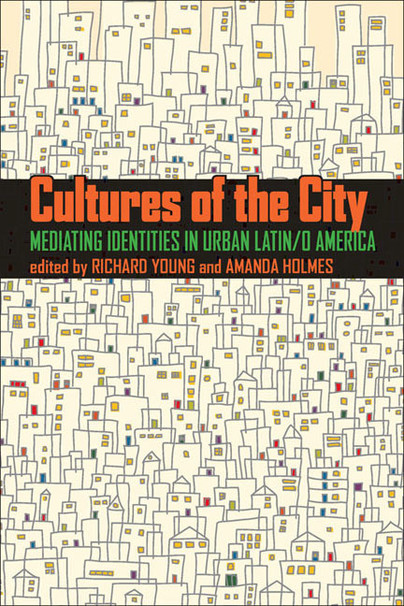
Format: Paperback
Pages: 264
ISBN: 9780822961208
Pub Date: 31 Dec 2010
Description:
Cultures of the City explores the cultural mediation of relationships between people and urban spaces in Latin/o America and how these mediations shape the identities of cities and their residents.Addressing a broad spectrum of phenomena and disciplinary approaches, the contributors to this volume analyze lived urban experiences and their symbolic representation in cultural texts. Individual chapters explore Havana in popular music; Mexico City in art; Buenos Aires, Recife, and Salvador in film; and Asuncion and Buenos Aires in literature.
Others focus on particular events, conditions, and practices of urban life including the Havana book fair, mass transit in Bogot\u00e1, the restaurant industry in Los Angeles, the media in Detroit, Andean festivals in Lima, and the photographic record of a visit by members of the Zapatista Liberation Army to Mexico City. The contributors examine identity and the sense of place and belonging that connect people to urban environments, relating these to considerations of ethnicity, social and economic class, gender, everyday life, and cultural practices. They also consider history and memory and the making of places through the iterative performance of social practices. As such, places are works in progress, a condition that is particularly evident in contemporary Latin/o American cities where the opposition between local and global influences is a prominent facet of daily life.These core issues are theorized further in an afterword by Abril Trigo, who takes the chapters as a point of departure for a discussion of the dialectics of identity in the Latin/o American global city.

Format: Paperback
Pages: 192
ISBN: 9780822961079
Pub Date: 12 Dec 2010
Description:
In Re-reading Poets, Paul Kameen offers a deep reflection on the importance of poets and poetry to the reader. Through his historical, philosophical, scholarly, and personal commentary on select poems, Kameen reveals how these works have helped him form a personal connection to each individual poet. He relates their profound impact not only on his own life spent reading, teaching, and writing poetry, but also their potential to influence the lives of readers at every level.
In an examination of works by William Wordsworth, Samuel Taylor Coleridge, Walt Whitman, and others, Kameen seeks to sense each authorÆs way of seeing, so that author and reader may meet in a middle ground outside of their own entities where life and art merge in deeply intimate ways. Kameen counters ideologies such as New Criticism and poststructuralism that marginalize the author, and instead focuses on the author as a vital presence in the interpretive process. He analyzes how readers look to the past via \u201ctradition,\u201d conceptualizing history in ways that pre-process texts and make it difficult to connect directly to authors. In this vein, Kameen employs examples from T. S. Eliot, Martin Heidegger, and Mikhail Bakhtin.Kameen examines how people become poets and how that relates to the process of actually writing poems. He tells of his own evolution as a poet and argues for poetry as a means to an end beyond the poetic, rather than an end in itself. In Re-reading Poets, KameenÆs goal is not to create a new dictum for teaching poetry, but rather to extend poetryÆs appeal to an audience far beyond academic walls.
Ties That Bind
Format: Paperback
Pages: 296
ISBN: 9780822961475
Pub Date: 06 Dec 2010
Description:
In the early days of utility development, municipalities sought to shape the new systems in a variety of ways even as private firms struggled to retain control and fend off competition. In scope and consequence, some of the battles dwarfed the contemporary one between local jurisdictions and cable companies over broadband access to the Internet. In this comparative historical study, Jacobson draws upon economic theory to shed light on relationships between technology, market forces, and problems of governance that have arisen in connection with different utility networks over the past two hundred years.
He focuses on water, electric, and cable television utility networks and on experiences in four major American cities -- Boston, Seattle, San Francisco, and Pittsburgh, arguing that information and transactions costs have played decisive roles in determining how different ownership and regulatory arrangements have functioned in different situations.Using primary sources and bold conceptualizations, Jacobson begins his study by examining the creation of centralized water systems in the first half of the nineteenth century, moves to the building of electric utilities from the 1880s to the 1980s, and concludes with an analysis of cable television franchising from the 1960s to the 1980s. Ties That Bind addresses highly practical questions of how to make ownership, regulatory, and contracting arrangements work better and also explores broader concerns about private monopoly and the role of government in society.
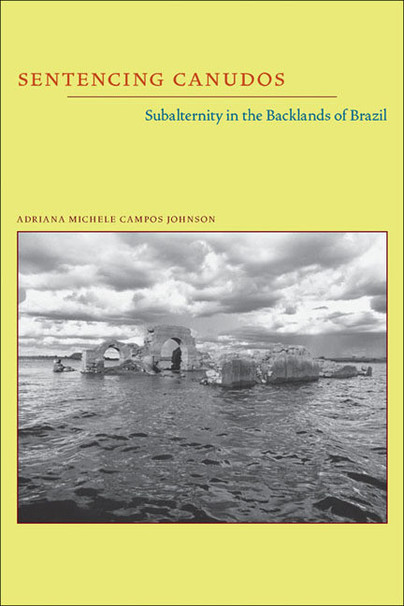
Format: Paperback
Pages: 240
ISBN: 9780822961239
Pub Date: 05 Dec 2010
Series: Illuminations
Description:
In the late nineteenth century, the Brazilian army staged several campaigns against the settlement of Canudos in northeastern Brazil. The colonyÆs residents, primarily disenfranchised former slaves, mestizos, landless farmers, and uprooted Indians, followed a man known as Antonio Conselheiro (\u201cThe Counselor\u201d), who promoted a communal existence, free of taxes and oppression. To the fledgling republic of Brazil, the settlement represented a threat to their system of government, which had only recently been freed from monarchy.
Estimates of the death toll at Canudos range from fifteen thousand to thirty thousand. Sentencing Canudos offers an original perspective on the hegemonic intellectual discourse surrounding this monumental event in Brazilian history. In her study, Adriana Michele Campos Johnson offers a close examination of nation building and the silencing of \u201cother\u201d voices through the reinvisioning of history. Looking primarily to Euclides da CunhaÆs Os Sert\u00f5es, which has become the defining—and nearly exclusive—account of the conflict, she maintains that the events and people of Canudos have been \u201csentenced\u201d to history by this work. Johnson investigates other accounts of Canudos such as local oral histories, letters, newspaper articles, and the writings of CunhaÆs contemporaries, Afonso Arinos and Manoel Ben\u00edcio, in order to strip away political agendas. She also seeks to place the inhabitants and events of Canudos within the realm of \u201ceverydayness\u201d by recalling aspects of daily life that have been left out of official histories.Johnson analyzes the role of intellectuals in the process of culture and state formation and the ensuing sublimation of subaltern histories and populations. She echoes recent scholarship that posits subalternity as the product of discourse that must be disputed in order to recover cultural identities and offers a view of Canudos and postcolonial Latin America as a place to think from, not about.
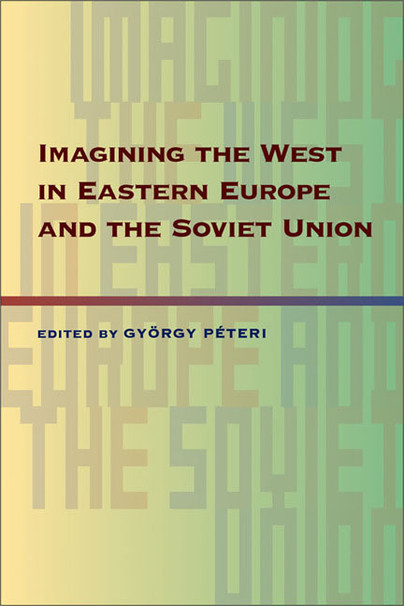
Format: Paperback
Pages: 336
ISBN: 9780822961253
Pub Date: 28 Nov 2010
Description:
This volume presents work from an international group of writers who explore conceptualizations of what defined \u201cEast\u201d and \u201cWest\u201d in Eastern Europe, imperial Russia, and the Soviet Union. The contributors analyze the effects of transnational interactions on ideology, politics, and cultural production. They reveal that the roots of an East/West cultural divide were present many years prior to the rise of socialism and the cold war.
The chapters offer insights into the complex stages of adoption and rejection of Western ideals in areas such as architecture, travel writings, film, music, health care, consumer products, political propaganda, and human rights. They describe a process of mental mapping whereby individuals \u201ccaptured and possessed\u201d Western identity through cultural encounters and developed their own interpretations from these experiences. Despite these imaginaries, political and intellectual elites devised responses of resistance, defiance, and counterattack to defy Western impositions.Socialists believed that their cultural forms and collectivist strategies offered morally and materially better lives for the masses and the true path to a modern society. Their sentiments toward the West, however, fluctuated between superiority and inferiority. But in material terms, Western products, industry, and technology, became the ever-present yardstick by which progress was measured. The contributors conclude that the commodification of the necessities of modern life and the rise of consumerism in the twentieth century made it impossible for communist states to meet the demands of their citizens. The West eventually won the battle of supply and demand, and thus the battle for cultural influence.

Format: Paperback
Pages: 304
ISBN: 9780822960782
Pub Date: 28 Nov 2010
Description:
Political participation rates have declined steadily in Mexico since the 1990s. The decline has been most severe among the poor, producing a stratified pattern that more and more mirrors MexicoÆs severe socioeconomic inequalities. Poverty of Democracy examines the political marginalization of MexicoÆs poor despite their key role in the struggle for democracy.
Claudio A. Holzner uses case study evidence drawn from eight years of fieldwork in Oaxaca, and from national surveys to show how the institutionalization of a free-market democracy created a political system that discourages the political participation of MexicoÆs poor by limiting their access to politicians at the local and national level. Though clean elections bolster political activity, Holzner shows that at the local level, and particularly in MexicoÆs poorest regions, deeply rooted enclaves of authoritarianism and clientelism still constrict peopleÆs political opportunities.To explain this phenomenon, Holzner develops an institutional theory in which party systems, state-society linkages, and public policies are the key determinants of citizen political activity. These institutions shape patterns of political participation by conferring and distributing resources, motivating or discouraging an interest in politics, and by affecting the incentives citizens from different income groups have for targeting the state with political activity.HolznerÆs study sheds light on a disturbing trend in Latin America (and globally), in which neoliberal systems exacerbate political and economic disparities and create institutions that translate economic inequalities into political ones.
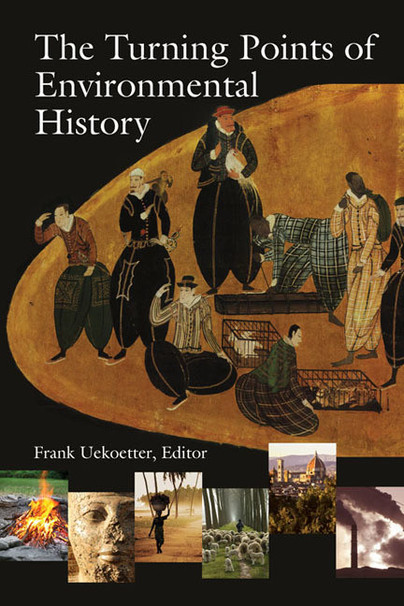
Format: Paperback
Pages: 220
ISBN: 9780822961185
Pub Date: 21 Nov 2010
Description:
From the time when humans first learned to harness fire, cultivate crops, and domesticate livestock, they have altered their environment as a means of survival. In the modern era, however, natural resources have been devoured and defiled in the wake of a consumerism that goes beyond mere subsistence. In this volume, an international group of environmental historians documents the significant ways in which humans have impacted their surroundings throughout history.
John McNeill introduces the collection with an overarching account of the history of human environmental impact. Other contributors explore the use and abuse of the earth’s land in the development of agriculture, commercial forestry, and in the battle against desertification in arid and semi-arid regions. Cities, which first appeared some 5,500 years ago, have posed their own unique environmental challenges, including dilemmas of solid waste disposal, sewerage, disease, pollution, and sustainable food and water supplies.The rise of nation-states brought environmental legislation, which often meant “selling off” natural resources through eminent domain. Perhaps the most damaging environmental event in history resulted from a “perfect storm” of effects: cheap fossil fuels (especially petroleum) and the rapid rise of personal incomes during the 1950s brought an exponential increase in energy consumption and unforseen levels of greenhouse gasses to the earth’s atmosphere. By the 1970s, the deterioration of air, land, and water due to industrialization, population growth, and consumerism led to the birth of the environmental and ecological movements. Overall, the volume points to the ability and responsibility of humans to reverse the course of detrimental trends and to achieve environmental sustainability for existing and future populations.
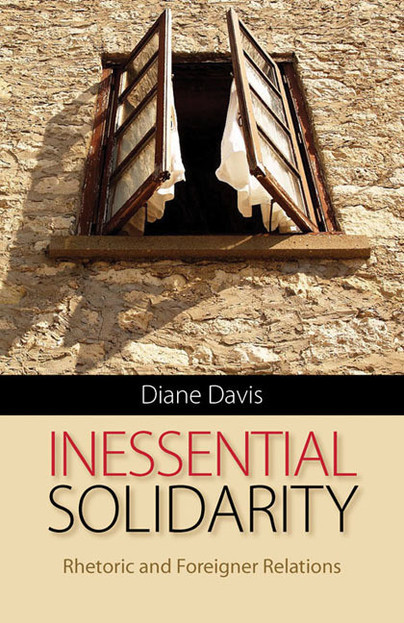
Format: Paperback
Pages: 228
ISBN: 9780822961222
Pub Date: 14 Nov 2010
Description:
In Inessential Solidarity, Diane Davis examines critical intersections of rhetoric and sociality in order to revise some of rhetorical theoryÆs basic presumptions. Rather than focus on the arguments and symbolic exchanges through which social relations are defined, Davis exposes an underivable rhetorical imperative, an obligation to respond that is as undeniable as the obligation to age. Situating this response-ability as the condition for, rather than the effect of, symbolic interaction, Davis both dissolves contemporary concerns about linguistic overdetermination and calls into question long-held presumptions about rhetoricÆs relationship with identification, figuration, hermeneutics, agency, and judgment.
Spotlighting a rhetorical \u201csituation\u201d irreducible to symbolic relations, Davis proposes quite provocatively that rhetoric—rather than ontology (Aristotle/Heidegger), epistemology (Descartes), or ethics (Levinas)—is \u201cfirst philosophy.\u201d The subject or \u201csymbol-using animal\u201d comes into being, Davis argues both with and against Emmanuel Levinas, only inasmuch as it responds to the other; the priority of the other is not a matter of the subject's choice, then, but of its inescapable predicament. Directing the readerÆs attention to this inessential solidarity without which no meaning-making or determinate social relation would be possible, Davis aims to nudge rhetorical studies beyond the epistemological concerns that typically circumscribe theories of persuasion toward the examination of a more fundamental affectability, persuadability, responsivity.

Format: Paperback
Pages: 304
ISBN: 9780822961116
Pub Date: 24 Oct 2010
Description:
By the end of the eighteenth century, Peru had witnessed the decline of its once-thriving silver industry and had barely begun to recover from massive population losses due to smallpox and other diseases. At the time, it was widely believed that economic salvation was contingent upon increasing the labor force and maintaining as many healthy workers as possible. In Medicine and Politics in Colonial Peru, Adam Warren presents a groundbreaking study of the primacy placed on medical care to generate population growth during this era.
The Bourbon reforms of the eighteenth century shaped many of the political, economic, and social interests of Spain and its colonies. In Peru, local elites saw the reforms as an opportunity to positively transform society and its conceptions of medicine and medical institutions in the name of the Crown. Creole physicians, in particular, took advantage of Bourbon reforms to wrest control of medical treatment away from the Catholic Church, establish their own medical expertise, and create a new, secular medical culture. They asserted their new influence by treating smallpox and leprosy, by reforming medical education, and by introducing hygienic routines into local funeral rites, among other practices. Later, during the early years of independence, government officials began to usurp the power of physicians and shifted control of medical care back to the church. Creole doctors, without the support of the empire, lost much of their influence, and medical reforms ground to a halt. As Warren’s study reveals, despite falling in and out of political favor, Bourbon reforms and creole physicians were instrumental to the founding of modern medicine in Peru, and their influence can still be felt today.
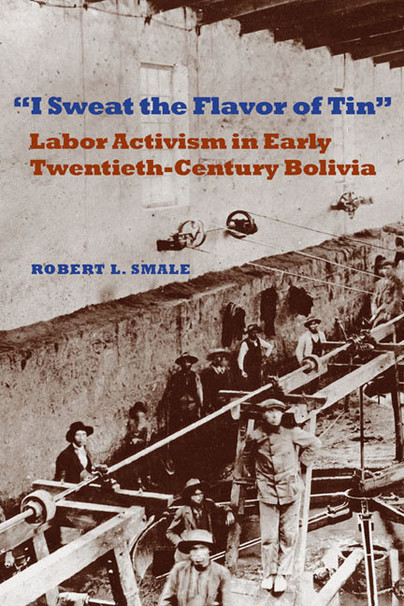
Format: Paperback
Pages: 248
ISBN: 9780822961178
Pub Date: 26 Sep 2010
Description:
On June 4, 1923, the Bolivian military turned a machine gun on striking miners in the northern Potos\u00ed town of Unc\u00eda. The incident is remembered as BoliviaÆs first massacre of industrial workers. The violence in Unc\u00eda highlights a formative period in the development of a working class who would eventually challenge the oligarchic control of the nation.
Robert L. Smale begins his study as BoliviaÆs mining industry transitioned from silver to tin; specifically focusing on the region of Oruro and northern Potos\u00ed. The miners were part of a heterogeneous urban class alongside artisans, small merchants, and other laborers. Artisan mutual aid societies provided miners their first organizational models and the guidance to emancipate themselves from the mine ownersÆ political tutelage. During the 1910s both the WorkersÆ Labor Federation and the Socialist Party appeared in Oruro to spur more aggressive political action. In 1920 miners won a comprehensive contract that exceeded labor legislation debated in Congress in the years that followed. Relations between the working class and the government deteriorated soon after, leading to the 1923 massacre in Unc\u00eda. Smale ends his study with the onset of the Great Depression and premonitions of war with Paraguay—twin cataclysms that would discredit the old oligarchic order and open new horizons to the labor movement.This periodÆs developments marked the entry of workers and other marginalized groups into Bolivian politics and the acquisition of new freedoms and basic rights. These events prefigure the rise of Evo Morales—a union activist born in Oruro—in the early twenty-first century.
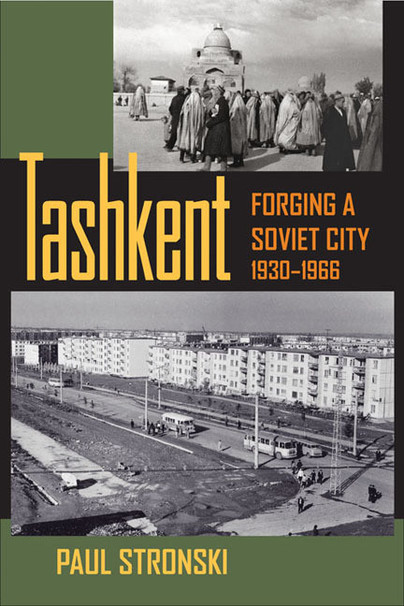
Format: Paperback
Pages: 368
ISBN: 9780822961130
Pub Date: 19 Sep 2010
Description:
Paul Stronski tells the fascinating story of Tashkent, an ethnically diverse, primarily Muslim city that became the prototype for the Soviet-era reimagining of urban centers in Central Asia. Based on extensive research in Russian and Uzbek archives, Stronski shows us how Soviet officials, planners, and architects strived to integrate local ethnic traditions and socialist ideology into a newly constructed urban space and propaganda showcase. The Soviets planned to transform Tashkent from a \u201cfeudal city\u201d of the tsarist era into a \u201cflourishing garden,\u201d replete with fountains, a lakeside resort, modern roadways, schools, hospitals, apartment buildings, and of course, factories.
The city was intended to be a shining example to the world of the successful assimilation of a distinctly non-Russian city and its citizens through the catalyst of socialism. As Stronski reveals, the physical building of this Soviet city was not an end in itself, but rather a means to change the people and their society. Stronski analyzes how the local population of Tashkent reacted to, resisted, and eventually acquiesced to the cityÆs socialist transformation. He records their experiences of the Great Terror, World War II, StalinÆs death, and the developments of the Krushchev and Brezhnev eras up until the earthquake of 1966, which leveled large parts of the city. Stronski finds that the Soviets established a legitimacy that transformed Tashkent and its people into one of the more stalwart supporters of the regime through years of political and cultural changes and finally during the upheavals of glasnost.
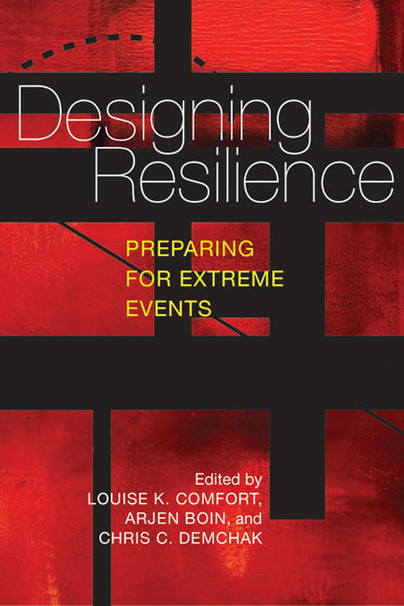
Format: Paperback
Pages: 384
ISBN: 9780822960614
Pub Date: 19 Sep 2010
Description:
In the wake of severe climatic events and terrorist acts, and the emergence of dangerous technologies, communities, nations, and global organizations have diligently sought to create strategies to prepare for such events. Designing Resilience presents case studies of extreme events and analyzes the ability of affected individuals, institutions, governments, and technological systems to cope with disaster. This volume defines resilience as it relates to disaster management at specific stages: mitigation, prevention, preparation, and response and recovery.
The book illustrates models by which to evaluate resilience at levels ranging from individuals to NGOs to governmental jurisdictions and examines how resilience can be developed and sustained. A group or nation\u2019s ability to withstand events and emerge from them with their central institutions intact is at the core of resilience. Quality of response, capacity to improvise, coordination, flexibility, and endurance are also determinants. Individual case studies, including Hurricane Katrina in the United States, the London bombings, and French preparedness for the Avian flu, demonstrate effective and ineffective strategies.The contributors reveal how the complexity and global interconnectivity of modern systems—whether they are governments, mobile populations, power grids, financial systems, or the Internet—have transcended borders and created a new level of exposure that has made them especially vulnerable to extreme events. Yet these far-reaching global systems also possess the ability to alert and respond at greater speeds than ever before. The authors analyze specific characteristics of resilient systems—the qualities they possess and how they become resilient—to determine if there are ways to build a system of resilience from the ground up. As such, Designing Resilience will inform a broad range of students and scholars in areas of public administration, public policy, and the social sciences.















